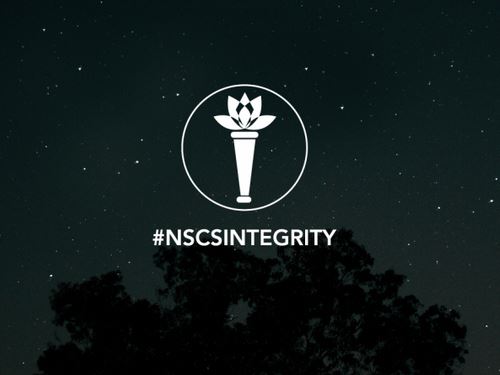We’re celebrating our NSCS core value: Integrity! Each year during the second week of February, NSCS chapters around the nation host “Integrity Week.” NSCS’ integrity initiative was inspired by a national ethics project created by The Association of College Honor Societies, which serves as an accrediting agency for honor societies. Integrity is also at the core of who we are and what we represent as an honor society and the reach of NSCS’s annual integrity initiative spreads campus wide. NSCS also offers an Inspire Integrity Award scholarship to on-campus faculty and students who are committed to integrity. Below is a piece from Justin, part of our National Leadership Council
I Hold The Torch To: Academic Integrity
Justin Pendleton, NLC
In the United States of America we hold a good deal of pride in our level of education. Furthermore, our country is nearing the point where the next natural step after high school is to move on to pursue higher education—whether it be at a community college, a vocational institute, or a four-year university. Well, what you would you do if I told you that you weren’t ready to take that next step? That you hadn’t been adequately prepared for the rigors of the next level throughout your years of primary and secondary education?
Well, according to the Department of Education, in years as recent as 2013, that hypothetical has turned into an overwhelming reality. The NAEP division of the Department of Education has concluded that only 39% of high-school seniors nationwide are at or above the national educational standards of reading, writing, and mathematics. This finding conversely means that 61% of the nation’s youth is not equipped to step foot into a college classroom with a fair shot of succeeding.
Now there are those who would answer this evidence with the notion that not all of the nation’s current high school seniors want to or have the means to attend a college or university, so in consequence, the ramifications of such a study are not relevant. To which those proponents would be correct, if the NAEP study only looked at postsecondary education; however, this particular study also evaluates skills that are necessary to succeeding in the workforce, but specifically in the first sequence: job training. That is why I hold the torch to the reorganization and enforcement of the college and workforce readiness plan!!
Think about it:
– Of the 24 million people that are enrolled in a college or university in the U.S., only 14 million of those students will graduate within 6 years of their enrollment date. What do you think will happen to the other 10 million who won’t graduate from college?
– The United States currently has a Department of Defense operating budget of 560.3 billion dollars, while the Department of Education has an operating budget of 68.6 billion dollars. That is an 8:1 ratio as far as spending on defense versus education. How much better do you think America’s students would be if even a fraction of the 560.3 billion was allocated to the educational fund?
As both students of the present and of the past, what do you think our educational system needs more of? And what is the best way to go about making sure these changes take place?


